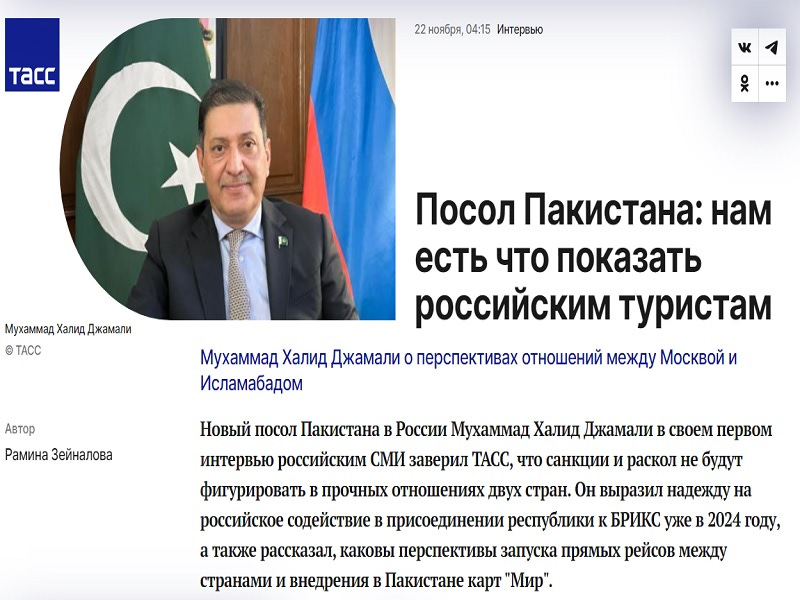Ambassador Jamali is truly committed to implementing the ambitious vision for bilateral ties that he described to TASS, but he’ll remain unable to make tangible progress in this respect until The Establishment gives its approval, which can’t be taken for granted given events over the past 18 months.
New Pakistani Ambassador to Russia Muhammad Khalid Jamali gave his first interview to TASS, which was published in Russian here but can be read by anyone using Google Translate. He hopes for more mutually beneficial cooperation, particularly in the energy sector, though it remains to be seen whether his country’s US-leaning de facto military leadership will allow this. After all, they’ve dillydallied on this since April 2022’s post-modern coup, and even reportedly sent arms to Ukraine over the past year too.
Two days before his interview was published, Pakistan’s Dawn newspaper published a piece about “The Russian oil mirage”. It preemptively contradicted Ambassador Jamali’s hopes that Pakistan will reliably procure cheaper Russian oil in the future by arguing that this supposedly isn’t possible in reality. Dawn has traditionally been considered close to Pakistan’s ruling military-intelligence duopoly, colloquially known as “The Establishment”, so this can be interpreted as a signal from them about their true stance.
On the one hand, this powerful group is telling the country and all those abroad who look to Dawn for insight into its elite’s policymaking calculations not to get their hopes up about their public representatives’ previous rhetoric regarding a strategic energy deal with Russia. At the same time, however, they presumably approved of Ambassador Jamali keeping these same hopes alive when giving his first interview to Russian media since arriving in that country.
It was assessed earlier this summer that “The Newly Appointed Pakistani Ambassador To Russia Will Have His Work Cut Out For Him” due to the interests of his country’s US-leaning de facto military leadership. With these concerns in mind, it makes sense why he devoted his time with TASS to reaffirming Pakistan’s hopes for more mutually beneficial cooperation, which was meant to alleviate some of Russia’s suspicions in order to preserve their hard-earned achievements thus far.
To be sure, bilateral relations have come a long way over the past half-decade. These two former rivals began a rapprochement aimed at advancing shared interests like anti-terrorist and energy cooperation without doing so at the expense of any third parties’ legitimate interests like India’s or the US’. Each government deserves praise for taking this impressive step, which testified to their geostrategic pragmatism at the time.
This positive trend was regrettably offset by April 2022’s post-modern coup in Pakistan. The scandalous deposal of former Prime Minister Imran Khan came shortly after his trip to Moscow where he met with President Putin to negotiate privileged agricultural and energy deals. Although his replacements insisted that the parliamentary process through which they removed him wasn’t driven by US pressure or his multipolar foreign policy, the de facto freeze in ties with Russia afterwards cast doubt on their claims.
Relations remained cordial, delegations continued visiting each other’s countries, and anti-terrorist cooperation wasn’t impeded, but anyone who denies the preceding observation is either misinformed of the facts or has an agenda in manipulating others’ perceptions of their ties since then. Their previously promising strategic energy plans, which were expected to form the basis for an eventual strategic partnership, practically ground to a halt from that day onwards.
Ambassador Jamali’s reaffirmation of his de facto US-leaning military leadership’s supposed consensus on the need to expand ties with Russia shows that the elite don’t want to formally do away with these plans out of fear that rubbishing them would reverse the progress they made on their rapprochement. They therefore seem to have calculated that it’s better to continue paying lip service to them in order to keep ties cordial and retain hard-earned mutually beneficial cooperation in other spheres.
Looking forward, the only realistic way in which ties can truly strengthen like Ambassador Jamali envisages is for his country’s military-intelligence duopoly to liberate itself from the US’ pernicious zero-sum influence by prioritizing Pakistan’s objective energy interests through a related deal with Russia. Doing so would greatly alleviate some of the financial pressures that their people have been forced to bear since April 2022’s post-modern coup exacerbated Pakistan’s preexisting multidimensional crises.
It would also serve to reassure the Global South that Pakistan is sincerely committed to a multipolar foreign policy and isn’t functioning as an American proxy like many have since come to suspect. Ambassador Jamali is truly committed to implementing the ambitious vision for bilateral ties that he described to TASS, but he’ll remain unable to make tangible progress in this respect until The Establishment gives its approval, which can’t be taken for granted given events over the past 18 months.




